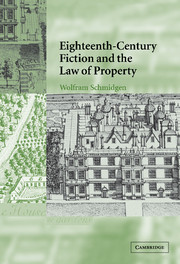Book contents
- Frontmatter
- Contents
- Acknowledgments
- Introduction
- 1 Communal form and the transitional culture of the eighteenth-century novel
- 2 Terra nullius, cannibalism, and the natural law of appropriation in Robinson Crusoe
- 3 Henry Fielding and the common law of plenitude
- 4 Commodity fetishism in heterogeneous spaces
- 5 Ann Radcliffe and the political economy of Gothic space
- 6 Scottish law and Waverley's museum of property
- Conclusion
- Notes
- Bibliography
- Index
Conclusion
Published online by Cambridge University Press: 22 September 2009
- Frontmatter
- Contents
- Acknowledgments
- Introduction
- 1 Communal form and the transitional culture of the eighteenth-century novel
- 2 Terra nullius, cannibalism, and the natural law of appropriation in Robinson Crusoe
- 3 Henry Fielding and the common law of plenitude
- 4 Commodity fetishism in heterogeneous spaces
- 5 Ann Radcliffe and the political economy of Gothic space
- 6 Scottish law and Waverley's museum of property
- Conclusion
- Notes
- Bibliography
- Index
Summary
Communal forms – the changing configuration of persons and things and its influence on the broad relationship between time, space, and practice – have been a key element in my argument. They have brought a unified perspective to my analyses and have resisted, as far as that is possible, the individualized, privatized, and reified outlook of modern capitalism. Their resolute stress on relationships has clarified that no exclusive focus on either persons or things can do justice to the social function of literature, and that, in order to recognize literature as a “symbolic meditation on the destiny of community,” we have to acknowledge the unity of human and material spheres. The recovery of such unity, indeed, has been one of the leitmotifs of this study as it has moved from a literalist reinterpretation of Locke's “mixing” metaphor to the contextualizing powers of the mercantile fetish, and from the Gothic castle as the ineluctable ground of political community to the sentimental and picturesque production of affective distance. In these cases and in others, the emphasis on communal form has ensured that the close analysis of property in a variety of texts could reveal social, economic, epistemological, and psychological limits to community.
The most important aspect of such unity on the level of literary form has been the relationship between narrative and description. Much vilified as an agent and embodiment of reification, description has been shown to be a relational and predictive mode that intersects human and material spheres.
- Type
- Chapter
- Information
- Eighteenth-Century Fiction and the Law of Property , pp. 214 - 217Publisher: Cambridge University PressPrint publication year: 2002

